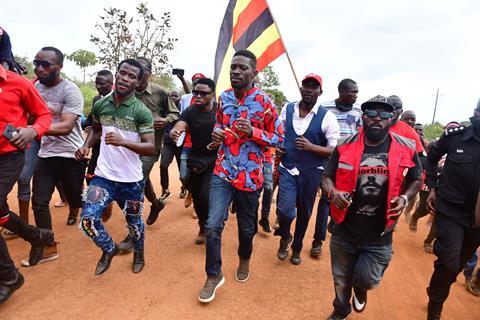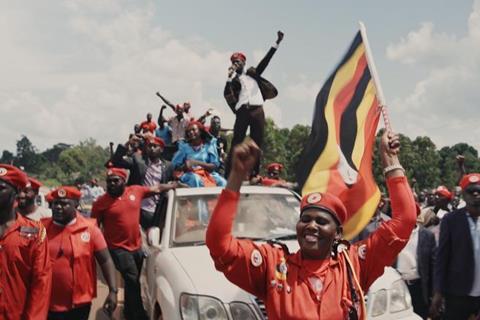Standing against Ugandan president Yoweri Museveni required great sacrifice from musician/politician Bobi Wine and his family. Screen talks to Moses Bwayo and Christopher Sharp, directors of Bobi Wine: The People’s President about documenting their story.

By the time he had finished work on the feature documentary Bobi Wine: The People’s President, Moses Bwayo had endured two attempted kidnappings on his wife, as well as great personal harm. “I had been arrested, locked up in prison, interrogated and shot in the face,” recalls the Uganda-born director, who eventually fled to the US. “The second day after I arrived [in America], I woke up and was just having this intense feeling of a return to normalcy. I was tasting food again and feeling that I’m breathing and I’m alive.”
Bobi Wine: The People’s President, which is Oscar-nominated for best documentary feature, details the journey of charismatic Ugandan musician-turned-politician Robert Kyagulanyi Ssentamu, known as Bobi Wine, and his wife Barbie, as he attempted to topple Yoweri Museveni’s oppressive regime during the 2021 Ugandan presidential election.
The film shows how Wine, born in the slums of Kampala, risks his life and those of his wife and children to challenge the rule of Museveni, in power since 1986. Wine used his music to denounce the regime and defend the oppressed and often voiceless people of Uganda — all in the face of Museveni’s police and military, and the beatings, shootings and torture employed to silence Wine and his supporters.
The project began in 2017 with UK filmmaker Christopher Sharp. He was born in Uganda but moved to the UK when he was 10, and has been back and forth to the region ever since, having spent his early working life as a film editor on music videos and commercials.
Sharp, who makes his directing debut along with Bwayo and also produces, first met the musician-politician and his wife while the couple were visiting Europe. Already a fan of Wine’s music, Sharp’s strong connection with Uganda through his family and early childhood inspired his decision to make a film about the country and the challenges it faced.
“When Bobi and Barbie started telling me their story and explained what they were trying to do, I found them totally compelling. They were both articulate, charming and, above all, brave,” says Sharp who had grown up in the same region of Uganda as Barbie, so the pair shared plenty of memories.
Monumental undertaking

After the subjects returned to the Ugandan capital of Kampala, Sharp assembled a team in the city to begin what would turn out to be a lengthy, dangerous and dynamic shoot. He began with Bwayo, who had studied at Kampala Film School and been mentored by director Mira Nair at her Maisha Film Lab for two years; Bwayo had a reputation as a courageous verité cinematographer and local fixer, working with ABC, the BBC and Vice News in Uganda. Bwayo went on to spend the next five years filming Bobi, Barbie, their family and entourage, and eventually became a director on the project alongside Sharp.
Initially, the two men worked with two Kampala-based directors of photography, Sam Benstead and Michele Sibiloni, but as the situation in Uganda became increasingly dangerous, the two DoPs exited the project amid concerns over personal safety. It was then that Bwayo — who had been working as a third camera — took over as the principal camera operator, as well as joining with Sharp as co-director, becoming “the main man on the ground”.
The pair would speak on the phone every day. “He was the one filming on the frontline, which allowed me to focus on the narrative, deciding what we needed and how it might look,” explains Sharp.
“My access to Bobi and his family grew as time went on, and as the presidential election got closer and closer,” continues Bwayo. “I knew the importance of the story. Being close to Bobi, and as a young Ugandan growing up in Uganda, I knew how much we had been alienated by politics. Regardless of the violence, regardless of the threats, I knew this was a task and a blessing to be telling the story of our country.”
Uganda is a young country, with 85% of the population under 35. Bwayo had never voted but “saw this revolution happening in front of me”. Together he and Sharp amassed 4,000 hours of footage, with Bwayo filming the politician in Uganda and Sharp shooting around the world, including Wine’s trips to the US for medical treatment — he believed he had been poisoned in an assassination attempt.
“It was hard to know when not to film. Bobi’s life was perilous and unpredictable. Anything could happen at any time. When you’re editing and you have that amount of material, you can go down so many different routes and it was just a matter of trying to decide what story we’re going to tell,” says Sharp. “We found sticking with Bobi and Barbie and the family the most powerful thing, seeing the pain that people in Uganda were going through, through them, seemed to work best.”
Some of the footage was so visceral that Sharp and Mwayo decided against using it to ensure the finished documentary would reach as wide an audience as possible. To help edit, Sharp sought out South African Paul Carlin, who had worked on Ghosts Of Rwanda, one of his favourite documentaries. “He was my man because he understood Africa.”
Carlin is also music-savvy and knew Wine’s material. “Bobi communicates with his people in Uganda through his music,” continues Sharp. “We knew that had to be part of the narration — the music we used, the songs we used also tell the story.”
Adult in the room
In 2018, Sharp met experienced UK documentary producer John Battsek and shared 10 minutes of footage he and Mwayo had cut together. Battsek agreed to produce the project with Sharp.
“Moses and I knew we needed someone who had experience to make a great film,” notes Sharp. “John was the adult in the room for a lot of the time, as a seasoned documentary producer.”
Battsek encouraged the filmmakers to trim the picture’s length to two hours, then sent it to Disney-owned National Geographic Documentary Films, which bought worldwide rights. “They genuinely cared about Bobi, Barbie and Uganda,” says Sharp.
Bobi Wine: The People’s President premiered at Venice Film Festival in September 2022. As the film cannot get official distribution in Uganda while Museveni remains in power, National Geographic cut a free-to-air YouTube version for Africa.
In addition to the Oscar nomination, Sharp has nods at Bafta for outstanding debut by a British writer, director or producer. “We know the West views Uganda as a stable country — one that toes the line and does what we want,” says Sharp. “Everyone knows Museveni is a dictator — he rigs elections, he doesn’t look after his people. It’s about what the film can do to liberate a country that’s been so incredibly moving.”
Shortly after finishing the film, Bwayo was forced to flee Uganda amid mounting threats against him and his family, and is seeking political asylum in the US. “Our story is not just a Ugandan story, it resonates today with the rise of totalitarianism around the world,” says Bwayo. “It’s about democracy and protecting its integrity.”

























No comments yet